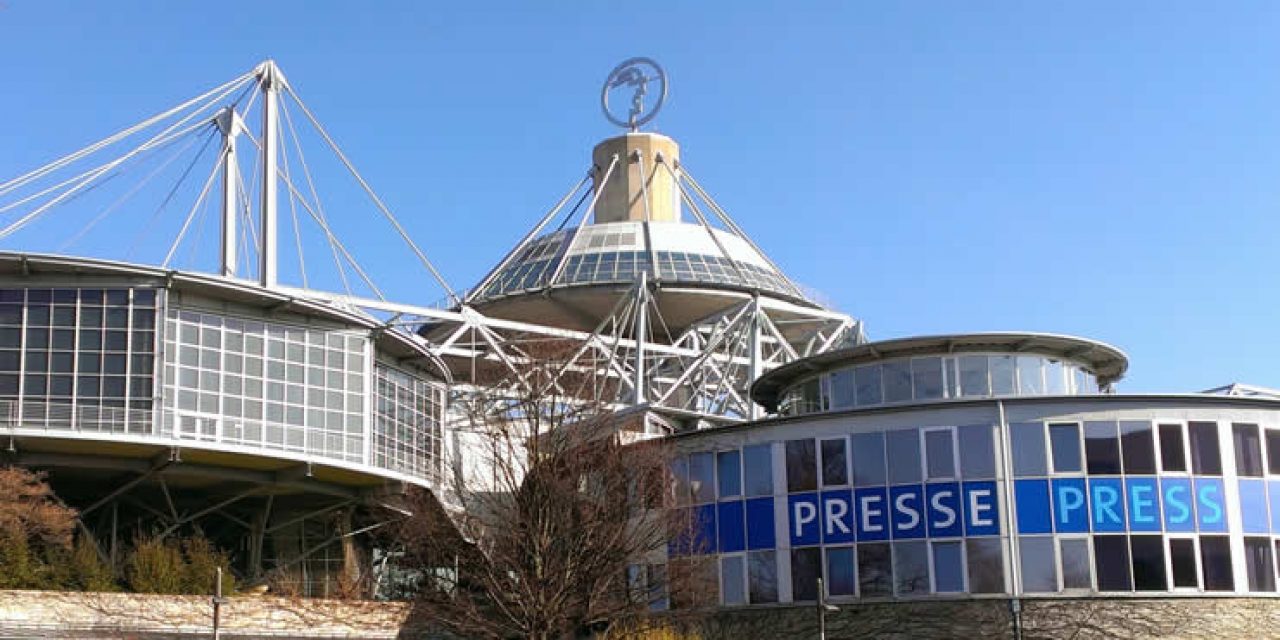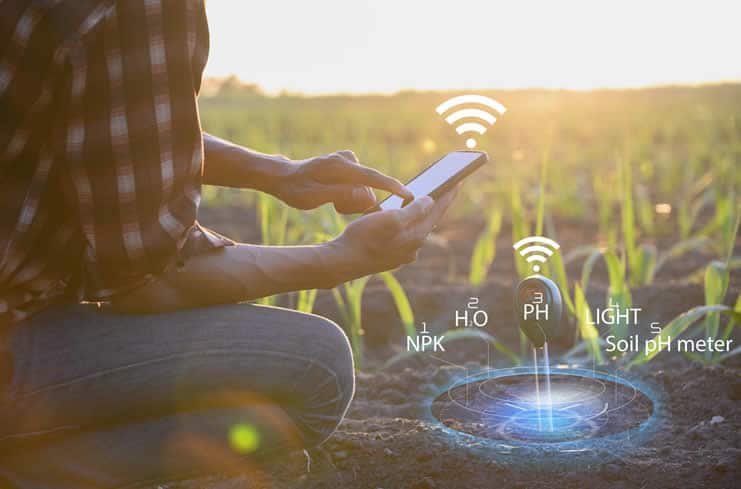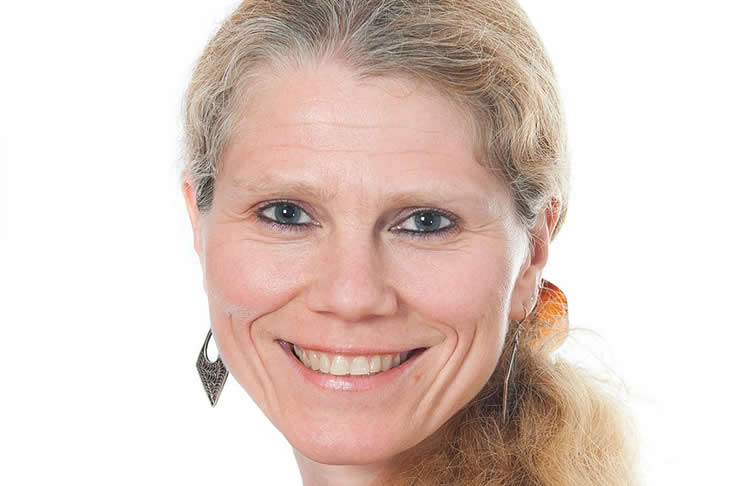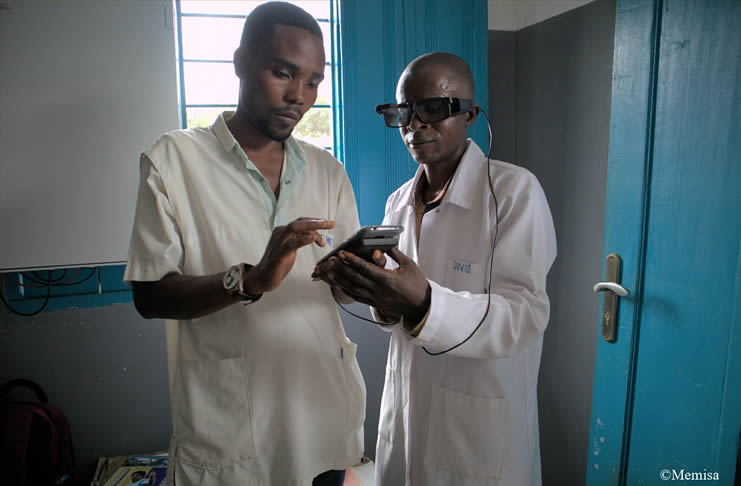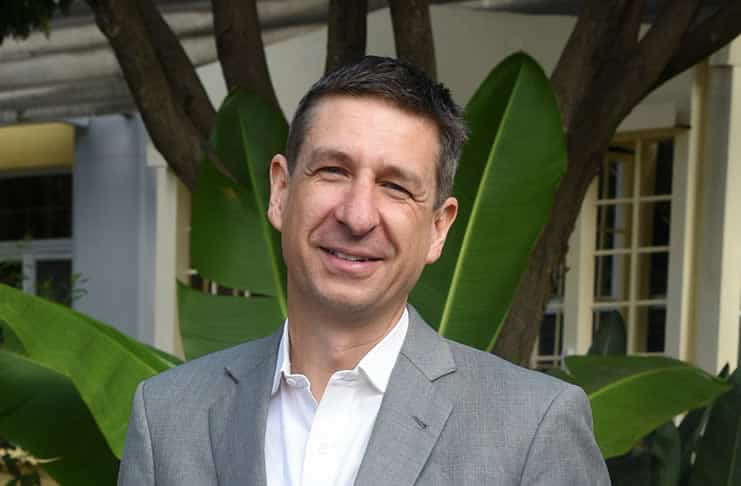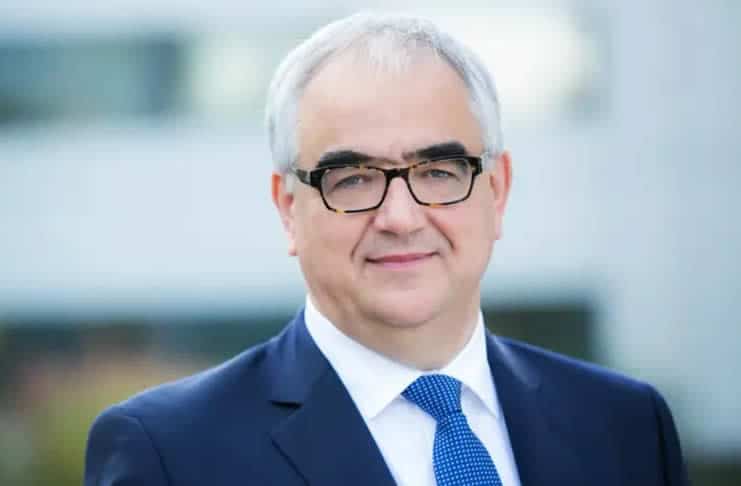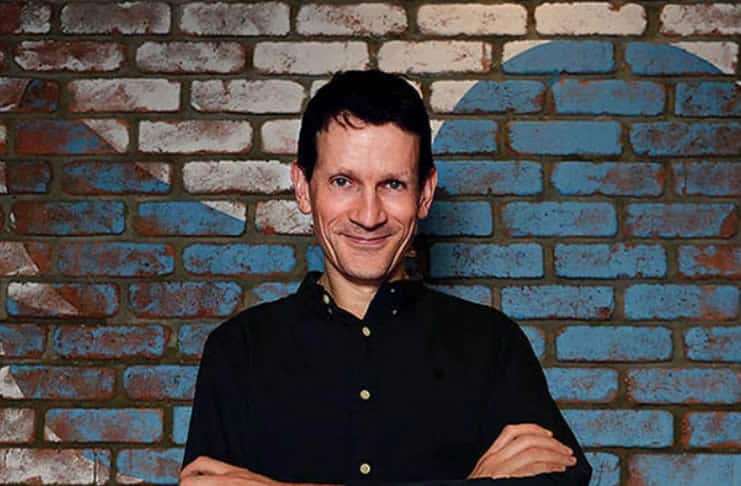The next stage of Industry 4.0 is here according to the organizers of Hannover Messe 2018. After many editions of the annual trade fair under the ‘Integrated Industry’ flag, in 2018 it’s all about Connect & Collaborate.
What is that next stage of Industry 4.0, what does “Integrated Industry – Connect & Collaborate” promise to visitors/industries/companies and what about the societal, human and ‘real-life’ business context beyond the solutions and technologies?
With ‘Integrated Industry – Connect & Collaborate’ we highlight how connectivity in industry facilitates completely new forms of business, work and collaboration. The result: more competitiveness, better jobs and new business models (Dr. Jochen Köckler, CEO Deutsche Messe AG)
The digital transformation of industry and the ways in which automation and energy technology, IT platforms and artificial intelligence work together in an increasingly converging and interchanging way, driving this industrial transformation. That is the leitmotiv of Hannover Messe 2018.
The impact of the many effects that these and other technologies (or better: sets of technologies) have when they are combined has been high on the agenda since Hannover Messe 2017 where the creation of value in Industry 4.0 took center stage.
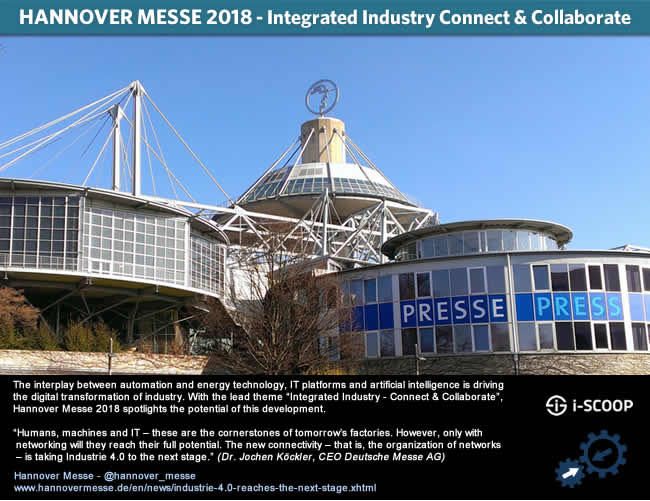
The theme of integration as such is an ongoing one for Hannover Messe. In 2013 we could say hi to integrated industry, in 2014 it was about the next steps in that integrated industry on the road to the self-organizing factory and on it went as the infographic at the occasion of Hannover Messe 2017 showed. And for Hannover Messe 2018, there is of course an updated version of that integrated industry theme timeline as you can see at the bottom of this post.
Integrated industry 2018: the interplay between automation, energy technology, IT platforms and technologies such as AI and IoT
Today it’s not just about the integration of IT and OT nor about just that integrated industry. We’re also past the stage where value creation had all the attention and with its lead theme “Integrated Industry – Connect & Collaborate” the organizers of Hannover Messe point out that next stage of Industrie 4.0: the mentioned interplay between automation and energy technology, IT platforms and artificial intelligence (AI) as a key driver.
By the way: do see a political or free trade and globalization message in it as well in these days of increasing isolationism and protectionism as became crystal clear at the opening ceremony (more below).
Yet, back to technologies and industrial transformation. Obviously integration and collaboration are key and certainly not just on the technology level. However, we indeed see how, to pick out one of the core topics, AI is popping up everywhere. This is also the case in those IT platforms and certainly in the cyber-physical dimension of Industrial IoT (IIoT) with the Internet of Things.
We see it in IIoT platforms and smart manufacturing platforms, we see it on the level of evolutions in business applications (e.g. i-ERP), we see it on the factory floor, in digital twins, in other VR/AR applications, at the edge (edge intelligence and edge computing), in asset and machine data analysis, human-machine interface applications, on device and sensor levels, the list goes on.
Humans, machines and IT are the cornerstones of tomorrow’s factories and only with networking will they reach their full potential (Dr. Jochen Köckler, CEO Deutsche Messe AG, Hannover Messe 2018 press kick-off)
And how else could it be? Connecting was a first stage with the goal to have machine and sensor data powering new applications. Inevitably, in order to create real value from ‘connected data’ you need to be able to leverage it in a meaningful way. Meaning, context and the insights brought by advanced analytics are enabled by AI which at the same time in various of its emanations such as machine learning brings us closer to that self-organizing intelligent (read: autonomous and, for now, semi-autonomous) dimension of Industry 4.0. Keeping in mind that AI is an umbrella term and its many ‘forms’ show everywhere, from smart buildings to smart factories, supply chain visibility, production processes and other areas where semi-autonomous (read: collaborative) and autonomous decisions are becoming important, a holistic and integrated vision indeed makes sense.
Industry 4.0 meets Logistics 4.0 at Hannover Messe 2018
That brings us to a second theme at Hannover Messe 2018 where the semi-autonomous and autonomous dimension have been key in the Industrie 4.0 vision since the very early days but get far more attention this year under the theme “Logistics 4.0 meets Industry 4.0″.
Logistics de facto is already key across ‘industry’, also in the stricter sense of the ‘smart manufacturing‘ industry. The theme, however, is there, not in the least because Hannover Messe and intralogistics tradeshow CeMAT are organized simultaneously (with CeMAT from now on each two years).
Industry 4.0 inevitably has an impact on logistics. We’d even put it the other way around: if logistics isn’t transforming there is no use in transforming manufacturing, mining, oil and gas, you name it. In the end it’s the full value chain that matters and, remembering what Sameer Patel said at CEBIT 2015 in the context of digital transformation and so-called digital disruption: “Who owns the audience, owns the last mile. Closest to customer, closest to disruption”.
Manufacturers and logistics companies know that very well and it is increasingly about owning “all the miles” as is clear when looking at the market from a solutions and big players perspective. The battles are often where the middlemen can be cut and it’s no different in industrial transformation in that regard. In the end, one of the goals of Industry 4.0 in some manufacturing segments is an ability to sell directly to consumers in a highly customized way and it’s also not surprising that companies are looking for integrated solutions (which the big vendors offer).
It’s also clear that it’s pretty hard to remove logistics companies. Amazon might aim for all the miles in the chain but for now it doesn’t make all the goods it sells. On a side note as we mentioned CEBIT: CEBIT 2018 is approaching fast as we write this at the eve of Hannover Messe 2018 . This year it’s taking place from June 12-15 in the same Deutsche Messe location in Hannover as per usual, where also Hannover Messe has its home.
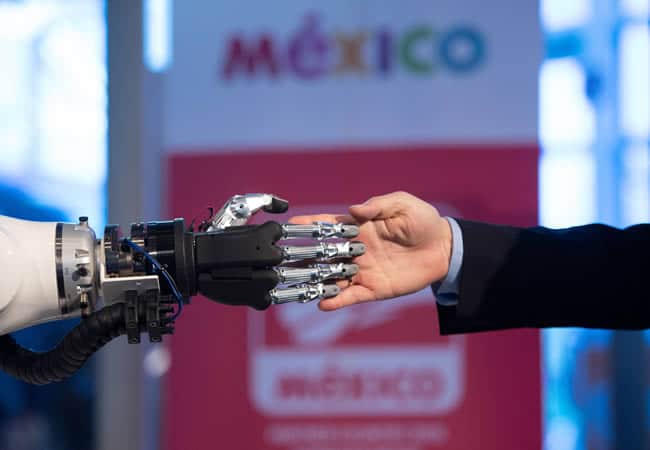
A look at AI, digital twins, integration and the core themes of Hannover Messe 2018: the evolutions
Back to converging technologies, the impact of the combined usage and cross-fertilization of technologies meeting each other and that other theme at Hannover Messe 2018: that interplay between automation and energy technology.
Focus on the integrated reality of digital twins
One area where AI, VR/AR, IoT and so forth are clearly gaining increased attention and at the same time a core theme in the “Integrated Industry – Connect and Collaborate” message of Hannover Messe 2018 concerns digital twin technology.
While certainly not yet for everyone there is indeed a rapid uptake of digital twin technology this year and the years after that as mentioned in a recent post on Gartner digital twin findings. Digital twins will take center stage at Hannover Messe 2018 and are rapidly adopted as Gartner but also IDC and others find and forecast.
The collaboration between man and machine
A second area where, again AI, machine learning, IoT and a range of next gen technologies are being emphasized at Hannover Messe 2018 but also start gaining traction fast in ever more industries and in manufacturing is the collaboration between man and machine.
It’s not just about cobots (collaborative robots) that have been shown in Hannover for years but also about the actual deployment of human-machine interaction in production environments with cobots and robots in combination with deep learning (self-learning essentially), machine vision and so on, whether it’s in the factory or in the automated rooting of plants using robots as mentioned in our article on ‘raising and nurturing AI, deep learning and robots‘. And of course human-machine interfaces in a non-robot context are present too.
Germany intends to increase its investments and research in artificial intelligence significantly and wants to spend 3.5% of its GDP on research by 2025 Angela Merkel said at the opening ceremony of Hannover Messe 2018
AI is many things and unlocks the capabilities of Industry 4.0
The interaction of AI and IoT, is part logical evolution and part innovation and increasing reality as we wrote in an article on the several domains where AI, IoT and more get combined in a lot of areas.
These include facility management, Industry 4.0, the usage of IoT (and all layers of the IoT stack with AI among others driving evolutions in the IoT platform market; the best IoT platforms for industrial applications today already have support for AI, IoT and AR/VR applications such as digital twins), healthcare, cobots and robots, HMI/SCADA software, i-ERP, manufacturing execution systems, edge computing and fog computing, massive data collection which drives the need for new predictive software algorithms, architectural structure changes in transistor technology, non-volatile memory, integrated silicon photonics and more as Ericsson CTO Erik Ekudden pointed out, networks (e.g. beamforming in future 5G networks), MEMS and transducers, the list is endless.
AI unlocks the true value of IoT the saying nowadays is. It also unlocks the true value of Industry 4.0 as it is all connected. Chance is that pretty soon also blockchain gets added to the ‘Connect and collaborate’ perspective as IoT and blockchain get more attention than ever. And then there is AI in smart workplaces and how visualization technology and advancements in Brain Computing Interface with the improvement of human-machine interaction systems are evolving due to the the convergence of AI, IoT and big data analytics.
Automation and energy technology: the Internet of Power and Energy as silos break down
The ways in which automation and energy technology work together and converge is a very interesting theme at Hannover Messe 2018.
Just as is the case in the notion of facility optimization in the end this is, among others, about the end of silos. Just like there are silos in facility management (building management systems on one hand, building energy management systems on the other with a range of other systems, simply put), similar silos exist in the scope of automation systems and technologies on one hand and energy systems and technologies on the other.
This is disappearing, in the end what facility optimization software is all about. In manufacturing we witness the same: the traditional systems are changing and at times converging and in some cases disappearing, making room for new applications. Yet, before that it is the case it’s mainly about connecting those silos as inevitably energy and power are key in Industry 4.0 but also the attention for energy overall drives changes in regulatory frameworks as we’ve recently seen again with the next steps in the energy measures of the EU (the new EPBD being one of many).
The main driver of it all, however, is king customer. Whether it concerns a building owner or a factory owner: energy and power efficiency, quality and reliability are simply a must, micro-grids are in demand and the need for power to literally power Industry 4.0, along with the need to save power and rely less on scarce natural resources and rely more on energy from innovative industrial solutions in a distributed power generation scope is clear and present which is food for a separate post (whereby it also needs to be said that power saving initiatives go all the way to the tiniest parts of the big Industry 4.0 equation, chips, sensors and so forth).
Under the umbrella of integrated energy, one of the key topics at Hannover Messe 2018 (all key topics further below), it is mainly about the market evolutions in this decentralized power generation environment. Quote: “Power is no longer generated only in conventional power stations, but also in many industrial processes and private households – consumers are becoming energy suppliers, and vice versa.”
The theme of Hannover Messe 2018: realities to take into account
If you look at the evolution of the themes at Hannover Messe it is clearly in line with the evolutions of vendors, innovations and the staged approach most organizations have when adopting IoT, Industry 4.0 projects and so forth. How else could it be?
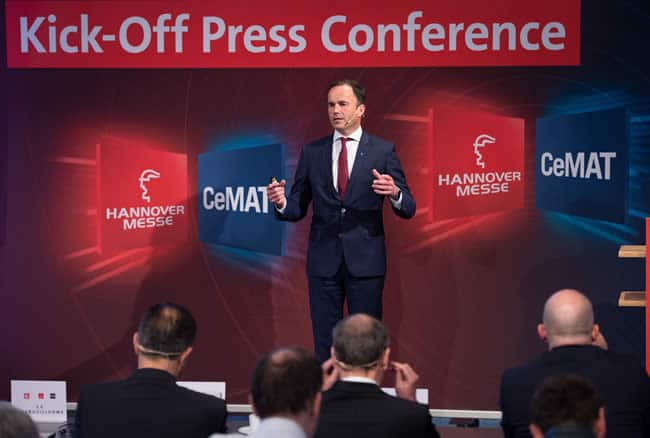
However, it’s important to also keep in mind the holistic nature of Industry 4.0 and of digital transformation which has always been our focus, along with the staged approach. Moreover, one has to be realistic. While many large organizations are already far ahead, in reality most aren’t at all.
Whether it concerns the adoption of IoT, Industrial IoT, AI, Industry 4.0 and so forth: for many it is only the beginning and for many it still has to start; go and visit some factories and ask or check what their main concerns and priorities are, see how ready they even are to start.
That can’t be overlooked. Just one data point in that regarding: according to Gartner only 4 percent of CIOs have implemented AI at this stage as you can read in our article on artificial intelligence in business. And Gartner doesn’t exactly look at small organizations. On the other hand, industrial markets still lead the pack in IoT spending but here too that doesn’t mean many companies still have to begin.
That too is the mission of a tradeshow like Hannover Messe. In that scope the theme of last year on how to create value in Industry 4.0 remains essential and is key for any vendor in its commercial approach, even more so than showing the latest possibilities.
Because in the end the value that is realized is all that matters. How do all these solutions and innovations help customers, their customers and all the stakeholders in their ecosystems, from shareholders to workers and the communities in which they operate?
Those are the real challenges ahead for industrial markets and Industry 4.0 in a changing global and societal context. And here as well connecting and collaborating is key, beyond the technologies. People first, always.
The organizers of course know this key role of people, connecting and societal aspects as well. The latter is one of the reasons why the event does everything to be a global one, works closely with industrial organizations (e.g. Industrial Internet Consortium), leading global vendors (in 2018 with two keynotes by Siemens with CEO Joe Kaeser and Chief HR Officer Janina Kugel – as mentioned in a recent article Siemens is extremely present again, this time with the theme ‘Digital Enterprise – Implement Now’; and with a keynote by KUKA CEO Till Reuter) and political/governmental instances (from regional ones to national ones and supranational ones such as the EU and global organizations) and policitcal leaders.
On the people front a quote from Dr. Jochen Köckler, CEO Deutsche Messe AG, Hannover at the pre-event press gathering: “Humans, machines and IT are the cornerstones of tomorrow’s factories and only with networking will they reach their full potential.”
The key topics at Hannover Messe 2018: (obviously) Industrie 4.0, the mentioned integrated energy, smart supply, predictive maintenance, cobots, lightweight construction (“structures and materials helping to minimize the weight of the end product without affecting its stability and reliability”) and digital twin.
Building bridges in the current global context – the message of the Hannover Messe 2018 opening ceremony
The event ceremony of Hannover Messe 2018 was opened by Hannover mayor Stefan Schostok and Carl Martin Welcker, President of the German Engineering Federation, VDMA; with the ceremony of the HERMES AWARD technology prize of Hannover Messe (won by German Endress+Hauser Messtechnik for their iTHERM TrustSens, the first self-calibrating thermometer), the evening before the start of the trade fair.
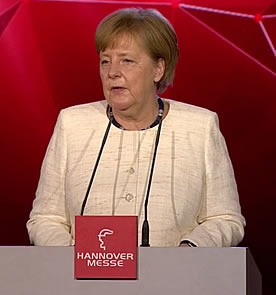
They were followed by Enrique Peña Nieto as Mexico is the 2018 partner country, and Angela Merkel who traditionally declares Hannover Messe opened. Both of course were the ‘real openers’ everyone wanted to hear. Enrique Peña Nieto, among others, emphasized Mexico’s reforms, economical growth, industrial success and plans as well as its renewal of a trade partnership with the EU and other partnerships the country has (with an obvious mention of his hopes regarding NAFTA and stating that partnerships are key for the success of countries such as Mexico and nations overall). We also know that Mexico’s President is a soccer fan and looks forward to see his country play against the Germans.
Angela Merkel among others mentioned how change is hard (but is inevitable and needs to be dealt with instead of resisted you can add), praised Mexico for its industrial and economic cooperation (with the German industry in particular, already more than 2,000 German companies in Mexico and with an Industry 4.0 partnership between Germany and Mexico), expressed her hope that people can work together a bit better than machines do (no comment needed, she did wink), said that ‘Connect & Collaborate’ always was key in trade and quoted explorer Alexander von Humboldt, known for many things such as his explorations in Central America and South America, in particular his well-known saying that the most dangerous worldviews are the worldviews of those who have never viewed the world. It wasn’t the first time von Humboldt was mentioned for the obvious reasons and the quote was clear.
Merkel also stated that industrial revolutions in the end always turned out for the better of people. Before declaring Hannover Messe 2018 officially opened she also emphasized that Germany plans to invest heavily in artificial intelligence (among others pointing to a few other countries that want to lead in AI, such as China). And it’s not just about AI. By 2025, Merkel said, Germany wants to spend 3.5 percent of its GDP on research. Merkel further highlighted the importance of STEM education and wants more women to pursue STEM education.
You’ve read and noticed it: it probably won’t come as a surprise that at the opening ceremony there was a lot on the current global situation and the need for cross-border collaboration as Germany and Mexico want to demonstrate, “urging to build bridges where others isolate themselves” to put it in the words of Carl Martin Welcker.
Mexico as a partner country is about more than business, agreements and deals. The fact that EU Brexit negotiator Michel Barnier opens the EU Policy Reception with a look at the impact of Brexit on industry isn’t just for fun. And yes, the opening ceremony of Deutsche Messe 2018 obviously was a message to ‘certain countries, or better, their leaders, as well although the political and industrial leaders of course don’t say as much, just as they didn’t mention others when talking about building bridges instead of walls (pretty hard to not see to whom that one was addressed) and calling for free and open entrepreneurship.
Hannover Messe 2018 theme in an infographic
More about the lead theme of Hannover Messe 2018 with a video where Hannover Messe Spokesman Onuora Ogbukagu summarizes them.
Below is that previously mentioned updated ‘Integrated Industry’ theme evolution infographic of Hannover Messe 2018. Curious what the theme in 2019 will be.

Top image: i-SCOOP. All other images are the property of their respective mentioned owners. The logo of Hannover Messe is the legal property of Deutsche Messe AG.
